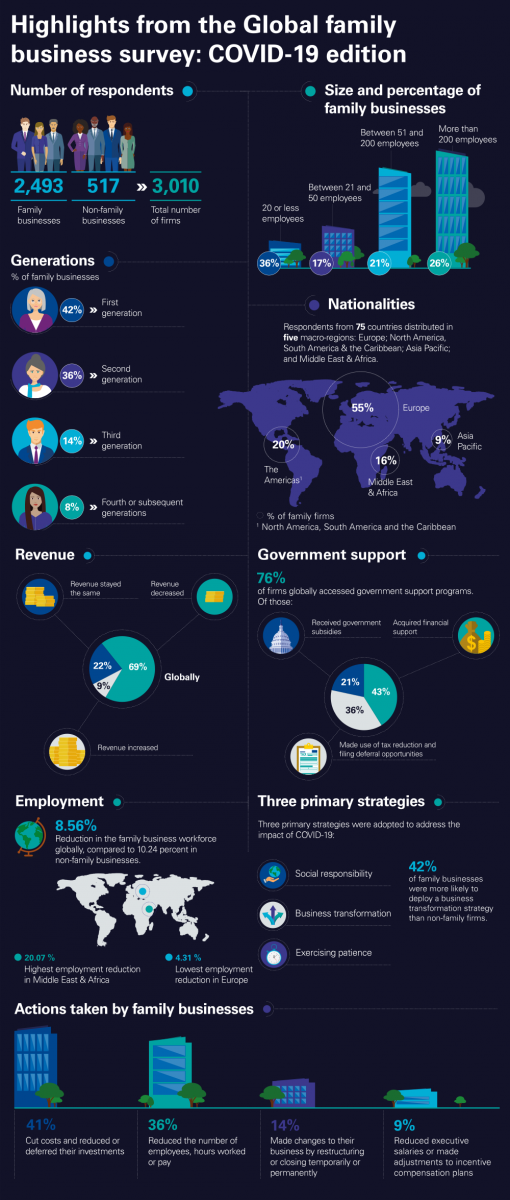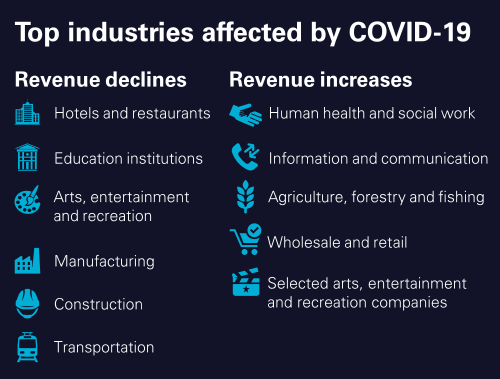The impact of Covid-19 on global family businesses

The impact of Covid-19 was felt almost immediately in most industries and regions of the world. We believed that the first indicator of the impact of Covid-19 on family and non-family businesses would be reflected in their revenue and that proved to be correct.
The first reaction was to reduce spending and employment expenses. Some family businesses turned to government programs for financial support. Others looked at ways to transform their businesses to reflect the reality of a changing global economy. Families reinforced their purpose and values to ensure that their governance practices and commitments to all their stakeholders would remain intact.
The impact of Covid-19 has varied from company to company, industry to industry and region to region. However, the one constant among family businesses has been the commitment to entrepreneurship that triggers their resilient instincts.
 Upside and downside impact
Upside and downside impact
With uncertain markets and government restrictions on social interactions and business operations in most areas of the world, the immediate impact of Covid-19 was on companies’ revenues.
Some 78% of family businesses reported that their revenues were affected directly and, of those companies, 83% experienced a decline. Perhaps surprisingly, the remaining 17% actually experienced a boost.
Absorbing the financial shock of Covid-19
Because of the uniqueness of family businesses and how the family’s involvement translates into a competitive advantage, it was our intention to explore, analyse and understand the actions that family businesses took in response to the pandemic. If there was an unexpected shock, what did family and non-family businesses do to absorb that shock?
 Regional support from government
Regional support from government
In September of 2020, a €100 billion ($121 billion) recovery plan was introduced in France to sustain competitiveness, cohesion and the advancement of the green economy (1).
Government in the United Arab Emirates created a virtual marketplace for employees. If it was necessary for one company to release 100 employees and another company needed 100, the virtual marketplace was a connector (2).
The impetus for change was boosted with the European Union’s six-year, €672.5 billion ($814 billion) “Recovery and Resilience” facility (3).
While for-profit businesses were supported through government stimulus programs and payroll protection plans, there was little support for non-profits, which may need to be addressed more fully in the future.
Purpose and values at work
In responding to the impact of Covid-19, many family members have played critical roles as owners of their businesses to safeguard their financial and emotional investment and to preserve the legacy. They are becoming more deeply involved in community support programs and putting additional governance practices in place to make sure that their contributions to social causes are aligned with their ESG strategies and fully integrated with the business strategies.
Increased family involvement
When many family businesses started to grasp what the pandemic might mean for their companies, they realised that more involvement and input was needed from the family. It was important for the family to re-engage, especially in situations in which management is entrusted to non-family executives. In some cases, senior family members have come back into the business to bring a historical context, while also ensuring that the family purpose and values remain intact.
 Managing stakeholder relationships
Managing stakeholder relationships
Family members are also collaborating with other business leaders in their community, customers, suppliers and other external stakeholders to diagnose underlying problems, develop solutions for the business and also address broader social concerns.
Download the Mastering a Comeback report here. KPMG explores how family businesses have responded to Covid-19 and how they are setting themselves up for success in the future in its virtual event on 14 May. Register here.
1 Annex measures sheet (PDF 3.9 MB)
2 Launch of AWS Virtual MarketPlace and Data Exchange in UAE
3 Recovery plan for Europe






